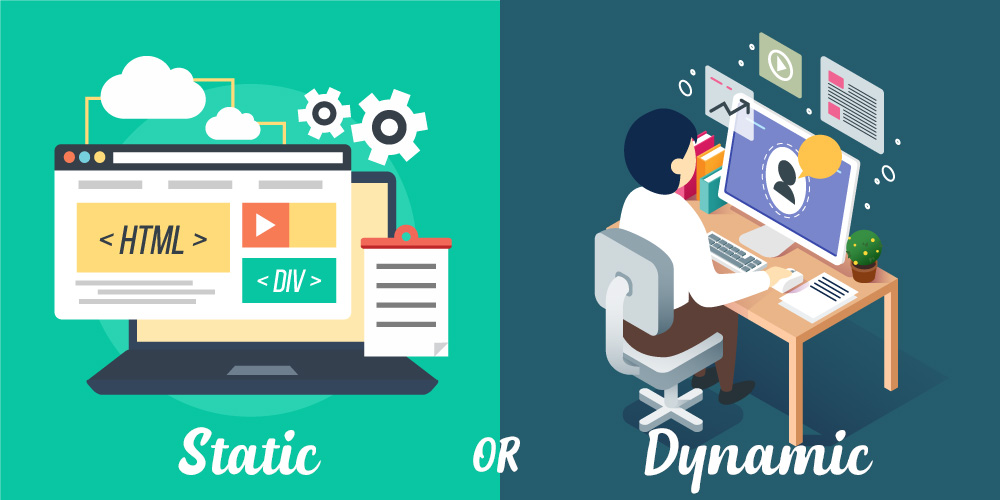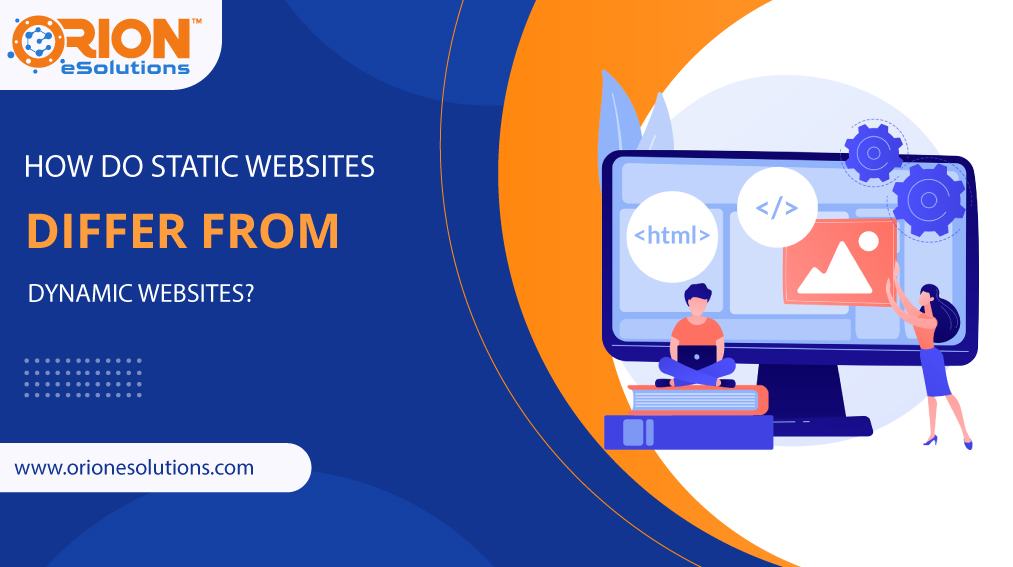Mainly, there are two main types of websites and they are popularly known as static and dynamic. The static websites have a simple structure and they show up similar content almost every year which is primarily written in the HTML. In contrast to this, dynamic websites are the ones that are used for displaying different types of content. Additionally, they also provide enhanced engagement with the help of advanced programming.
With this basic introduction, you must have understood that because of the level of simplicity, creating static websites is pretty easy as compared to the dynamic ones. In this article, we will explain the points of distinctions that shed some light on the topic of static vs dynamic websites.
After reading and understanding it in-depth, you will learn the static and dynamic website difference correctly. Read on to know the answer to the question “how do static websites differ from dynamic websites?”
STATIC WEBSITES
The numbers of pages on these websites are fixed and they have a particular type of layout. This means that when a page is displayed on any browser, the content that is displayed on the screen stays in one place and does not respond to any inputs.
These websites can be made with a combination of HTML and CSS is very easy to text editors. In case you want a simple website with a limited number of pages then you must choose this option. The best part is that it is very easy to create and does not require as much time as compared to the dynamic websites.
On the off chance, you decide to make the pages of your website look different then the code can be pretty easily duplicated on any of these changes. Static websites do not mean creating something with plain simple text. You can very well use multimedia tools like videos, pictures, etc.
DYNAMIC WEBSITES
A dynamic website is much more functional as compared to static websites. This is because they are highly attractive and functional. They are built on the basis of server-side and client-side languages like Java, PHP, etc. At the time when a user accesses a dynamic website, it can be changed through code runs in the browser of the server.
An important thing that must be noted is that these websites is that they take a little longer to build and the initial cost involved in making them is a little higher. With the help of many platforms like WordPress, making dynamic websites has become much easier.
THE CONCEPT BEHIND THE TERMS
STATIC WEBSITES
The word static means something that is constant or does not change due to any reason or in any way. This makes the concept behind static websites pretty obvious. Simple code and minimal design elements are enough to create it. It stays fixed with regards to the number of pages and they show up just in the way in which it was developed and designed.
DYNAMIC WEBSITES
As opposed to this, dynamic means something that has an element of change attached to it. Therefore, the dynamic websites are constantly transforming, they are highly functional and interactive as well.
In addition to being informational, they also include things that are known by functionality and the level of engagement. In simple terms, it is difficult to build and design these websites because of their versatility.
THE TECHNOLOGICAL ASPECT
STATIC WEBSITES
While understanding the difference between the two from a technical angle, the contrast is even more evident. Due to the fact that the content in static websites stays fixed, it is very easy to create them in HTML. There is only one way in which the user can interact with the static pages and that is with the help of hyperlinks and forms.
DYNAMIC WEBSITES
These are created on the combination of HTML and CSS. However, server side programming is required to make them even more functional. Basically, the HTML creates the design element and the server-side languages are used to manage the events and the controls on the pages.
CODING USED
STATIC WEBSITES
In order to build a static website, the user does not need to utilize the complex programs. A little knowledge of HTML and CSS in addition to the knowledge of a simple editor like notepad will be enough to create an easy static website.
The static pages include many different aspects such as text and different types of multimedia. These are pretty simple and not as technical as compared to the dynamic ones which also makes then ineffective. The users will get to see only one type of content on the websites until the code gets changed manually.
DYNAMIC WEBSITES
In contrast to the static ones, the dynamic websites are the ones in which the content gets displayed on the actions of the users. The choices of the users are the basis of what gets shown to them.
This is a rather intricate process that is based on the complexities of the website. A developer needs to be proficient in good technical skills in server-side programming to be able to qualify to build a good dynamic website.

THE TYPE OF CONTENT
STATIC WEBSITES
The type of content which is seen by the users on static websites does not have to be manipulated in any way. Similar pages get delivered every time because only one HTML file gets uploaded every time as stored. All the content stays constant over all the pages so it is important for the content publisher to gain comprehensive know-how of HTML for updating the content on the website.
DYNAMIC WEBSITES
Alternately, in dynamic websites, the content gets shown as per the request of the user and it keeps transforming every now and then. There is a flexibility to always change the content at any time needed which makes it simple for almost anyone to update the content.
CONCLUSION:
In the event that you are an effective owner of a website, you can tell the static and dynamic website difference seeing whether the pages are engaging or interactive or if it contains content that is intended to be seen or printed out only. In case you are thinking of making your own website then you have to settle on your decision dependent on the reason for the site and the accessible assets.
When it comes to deciding between the two, the dynamic websites are easier to manage because of the multiple benefits like data management and functionality. In case you wish to create a website that offers a high level of engagement to the users then you should prefer a dynamic website. Distinctively, if you wish to create something absolutely informative then you can go for the static websites. They can be a great source of educating people productively.
All in all, your final call should be based on exactly what do you want from a website. Choose wisely to get the best possible results from any type of website.
Also Read: WHY ISN’T ANYONE COMING TO MY WEBSITE?









